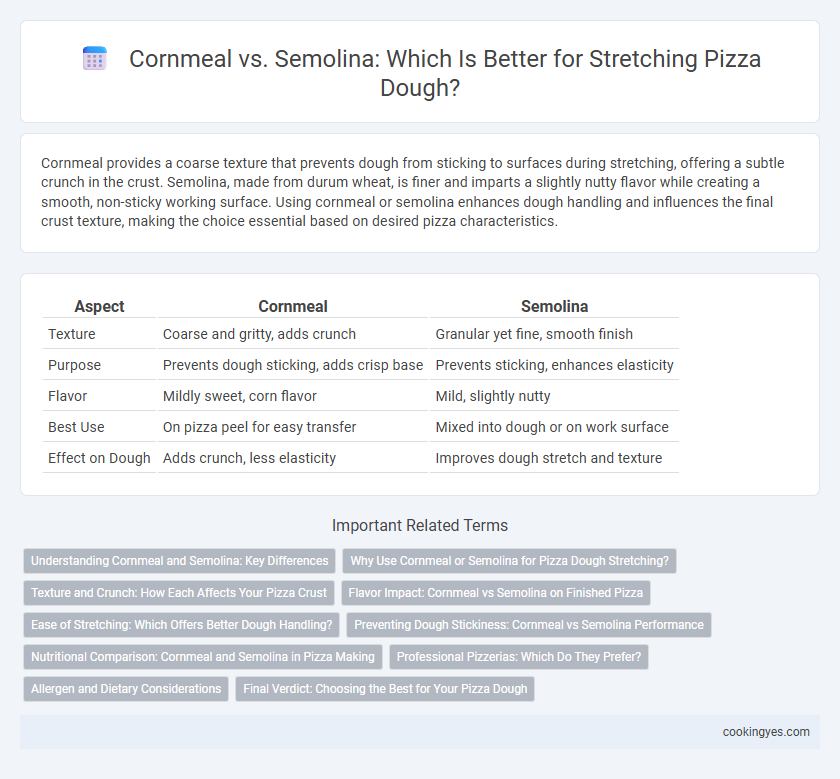Cornmeal provides a coarse texture that prevents dough from sticking to surfaces during stretching, offering a subtle crunch in the crust. Semolina, made from durum wheat, is finer and imparts a slightly nutty flavor while creating a smooth, non-sticky working surface. Using cornmeal or semolina enhances dough handling and influences the final crust texture, making the choice essential based on desired pizza characteristics.
Table of Comparison
| Aspect | Cornmeal | Semolina |
|---|---|---|
| Texture | Coarse and gritty, adds crunch | Granular yet fine, smooth finish |
| Purpose | Prevents dough sticking, adds crisp base | Prevents sticking, enhances elasticity |
| Flavor | Mildly sweet, corn flavor | Mild, slightly nutty |
| Best Use | On pizza peel for easy transfer | Mixed into dough or on work surface |
| Effect on Dough | Adds crunch, less elasticity | Improves dough stretch and texture |
Understanding Cornmeal and Semolina: Key Differences
Cornmeal and semolina differ primarily in texture and granularity, affecting pizza dough stretching and handling. Cornmeal, made from ground dried corn, has a coarser grain that prevents dough from sticking to surfaces, creating a slightly crunchy base, while semolina, derived from durum wheat, offers a finer, more abrasive texture that enhances elasticity and crispness in the crust. Choosing between cornmeal and semolina depends on the desired dough texture and stretchability for optimal pizza preparation.
Why Use Cornmeal or Semolina for Pizza Dough Stretching?
Cornmeal and semolina are commonly used to prevent pizza dough from sticking during stretching, ensuring a smooth, effortless transfer to the oven. Cornmeal offers a gritty texture that creates a natural barrier between the dough and the surface, while semolina's fine consistency provides excellent non-stick properties without affecting the dough's flavor. Both ingredients help achieve a crispier crust by absorbing excess moisture during the stretching process.
Texture and Crunch: How Each Affects Your Pizza Crust
Cornmeal creates a gritty, coarse texture that adds a distinctive crunch to the pizza crust, preventing the dough from sticking to surfaces during stretching. Semolina offers a finer, slightly grainy texture that enhances the dough's elasticity and produces a crisp yet tender crust. Choosing between cornmeal and semolina impacts the final mouthfeel, with cornmeal delivering a more robust crunch and semolina providing subtle crispness and improved dough handling.
Flavor Impact: Cornmeal vs Semolina on Finished Pizza
Cornmeal adds a slightly sweet, nutty flavor and a coarse crunch to the crust, enhancing the overall texture and taste of the finished pizza. Semolina provides a subtle, mildly sweet flavor and creates a firmer, more elastic dough, resulting in a crispier yet tender crust. The choice between cornmeal and semolina influences the pizza's flavor profile, texture, and mouthfeel, making it essential for achieving specific desired characteristics in the final bake.
Ease of Stretching: Which Offers Better Dough Handling?
Cornmeal provides a coarser texture that helps prevent dough from sticking, making it easier to handle during stretching and transferring. Semolina, with its finer granules, offers a slightly firmer grip that allows for more controlled stretching without tearing the dough. For optimal dough handling, semolina often offers better ease of stretching due to its balanced texture and less abrasive surface.
Preventing Dough Stickiness: Cornmeal vs Semolina Performance
Cornmeal, with its coarser texture, creates a rougher surface that effectively prevents pizza dough from sticking to the peel, making it easier to slide onto the stone or oven rack. Semolina, being finer yet still granular, offers a balance between stick prevention and dough handling, absorbing moisture more efficiently to reduce tackiness during stretching. Both cornmeal and semolina enhance dough performance, but cornmeal is preferred for its superior non-stick properties, while semolina provides a slightly finer, less gritty texture underfoot.
Nutritional Comparison: Cornmeal and Semolina in Pizza Making
Cornmeal and semolina offer distinct nutritional benefits when used in pizza dough stretching. Cornmeal is rich in fiber, antioxidants, and essential minerals like magnesium and phosphorus, enhancing digestive health and providing a gluten-free option. Semolina, derived from durum wheat, contains higher protein and gluten content, promoting dough elasticity and offering key nutrients such as iron, B vitamins, and selenium.
Professional Pizzerias: Which Do They Prefer?
Professional pizzerias often prefer semolina over cornmeal for dough stretching due to its finer texture, which allows for a smooth, non-sticky surface without compromising the dough's elasticity. Semolina's higher protein content contributes to better dough strength and extensibility, essential for creating thin, evenly stretched pizza bases. While cornmeal adds a slight crunch and prevents sticking, it can create uneven surfaces and is less favored in high-quality artisan pizza making.
Allergen and Dietary Considerations
Cornmeal is naturally gluten-free, making it ideal for individuals with gluten intolerance or celiac disease, whereas semolina contains gluten and is unsuitable for gluten-sensitive diets. Both ingredients can impact allergens differently; cornmeal may be preferable for those avoiding wheat-based allergens. Selecting between cornmeal and semolina for dough stretching depends on dietary restrictions and allergen sensitivities to ensure safe and enjoyable pizza preparation.
Final Verdict: Choosing the Best for Your Pizza Dough
Cornmeal provides a coarser texture that prevents sticking and adds a slight crunch to pizza crusts, ideal for achieving a rustic mouthfeel. Semolina, made from durum wheat, offers a finer grain and higher gluten content which promotes elasticity and a golden crust, perfect for thin, crispy Neapolitan-style pizzas. Selecting between cornmeal and semolina depends on dough handling preferences and desired crust texture, with semolina favored for stretchability and cornmeal for preventing dough adhesion during shaping.
Cornmeal vs Semolina for dough stretching Infographic

 cookingyes.com
cookingyes.com